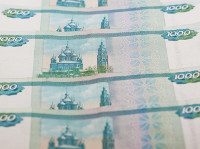Is Russian ruble ready to hit the bottom?
Already next year, the Central Bank of Russia let the ruble float freely and focus on containing inflation. How will the floating exchange rate affect the Russians? Will the Russian ruble go up or down?

The Russian ruble has been losing value rapidly. In general, the situation with the national currency of the Russian Federation is alarming. The fact that the Central Bank is prepared to let the ruble float freely and focus exclusively on containing inflation raises many questions too. Can one trust the ruble, or would it be more profitable for the Russians to convert their savings into dollars due to instability? Experts explain that it all depends on the capacity and quality of the savings.
"If we talk about interest rates on deposits on the market, then, in fact, their level, in general, takes into account the processes and changes in exchange rates that exist. If a person, for example, wants to open a ruble deposit, he or she would get, say, eight percent. Accordingly, a dollar deposit it in this bank would give eight percent, minus insurance against devaluation of the ruble at a rate of six percent, that is, roughly speaking, he will receive two percent," chief strategist of BCS financial Group Maxim Shein told Pravda.Ru. "That is, in this sense, when viewed from the perspective of the savings to be deposited, in principle, there is not a big difference, especially for short periods of time."
Obviously, when left without the control of the Central Bank, the Russian ruble will be more sensitive to fluctuations on the market. The expert sees nothing wrong about it, because the only thing that it can lead to is a difficulty in making short-term predictions for major changes of the currency pair rate (a month or week). At the same, forecasts for a longer period, e.g., for one year, will be a more rewarding endeavor, because it takes account of "fundamental factors" at a much greater extent. According to Maxim Shein, at the moment, all factors indicate that the ruble will lose six percent by the end of the year, and the rate will be about 35 rubles per dollar.
"If we proceed to action, what can we advise people? Firstly, like I said, if someone wants to make savings, there is no difference as to the currency used for savings. I myself have had the experience - I opened an account in dollars, and in the end it turned out that the ruble strengthened and I lost some money because of that. Those who want to completely get rid of such risks for their savings, then they can open an account in two different currencies. If it goes about business, then there is, of course, the hedging instrument, 5.5-6 percent, which will help businesses insure currency risk entirely."
However, not all experts are so optimistic about the Russian currency. Economist and professor Andrey Zaostrovtsev of the Higher School of Economics, believes that the U.S. dollar will soon be the most reliable currency, as the euro has not recovered from the economic turmoil. The Russian ruble will be gradually losing its value, he added.
"It will not be a dramatic process, of course, there will be fluctuations in both directions, but there is no forecast that would say that the ruble will weigh more in relation to the dollar and the euro. On the contrary, of course, the ruble will become be getting lighter and lighter. I would not keep savings in rubles, but if you are planning ruble expenses, then it has to be rubles. As for long-term periods, then of course, the euro-dollar pair would be best."
The professor believes that one should not invest in precious metals either.
"This is very unstable, unpredictable, there are greater risks," he said.
Maria Snytkova
Pravda.Ru
Subscribe to Pravda.Ru Telegram channel, Facebook, RSS!




